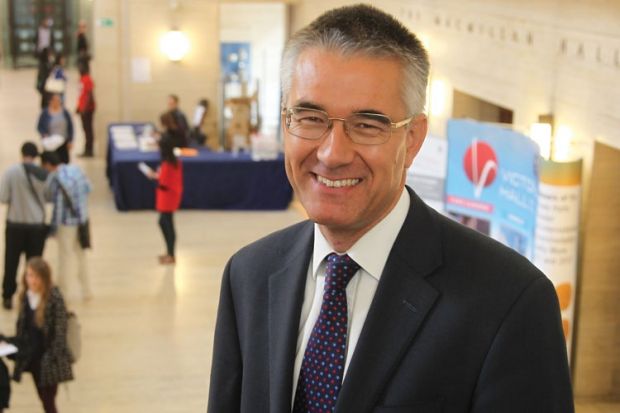After nearly two decades in human resources in the engineering sector and two years in the Civil Service, Kim Frost joined the University of London in 2003 as director of human resources. From 2010 he chaired the M25 Group for the sector-wide body Universities Human Resources. On 1 October he took up a one-year post as UHR’s chair.
Where and when were you born?
In a thatched cottage in the middle of the countryside, in the winter of 1960.
How has this shaped you?
We moved when I was 10 to Cambridge, and I’ve loved cities ever since, even though in those days Cambridge was a small, windswept place and not as large and well connected as it is now.
Universities are being allowed to expand their student numbers as never before. What are the implications for staffing?
When the pressure is there to bring in large numbers of new staff it is very important to have slick, modern recruitment systems and thorough assessment. Candidates can have a number of options and one of HR’s roles is to ensure that the recruitment process presents higher education in a thoroughly positive light.
Are all of those choosing to expand also increasing teaching staff in line with student numbers?
Of course it varies, but contact with academics is a major part of the student experience now. Universities that don’t keep a proper ratio are bound to suffer in areas such as the student satisfaction survey.
There has been a lot of financial flux in recent years. What is it like for HR professionals to be involved in major restructuring?
HR staff tend to bear the brunt of the emotions people feel when their work is affected by a restructuring. Learning to deal with anger and upset is a major part of an HR manager’s rite of passage, and I’ve known some who do it very well and some who don’t. A lot of the most important work of this sort that an HR department does around restructuring is never seen by anyone, and isn’t captured by any sort of performance indicator. But balancing the needs of individuals and the organisation is exactly the sort of challenge that makes HR work so interesting.
Is the divide between academic and administrative staff at universities growing or shrinking?
Generally speaking, there is a clear improvement. I’ve always hated the term “administrative”, which seems such a sloppy way of describing the range of professional services a modern university needs to underpin its academic offering. I detect a much greater willingness for people of all specialisms to work together.
Vice-chancellors typically have academic backgrounds. If you had to look in the ranks of any other profession to find the ideal university leader, which would it be?
All-knowing, diplomatic, forceful, enigmatic – only Jedi knights would do.
If you were a prospective university student facing £9,000 fees, would you go again or go straight into work?
I’d definitely go to university. I studied Greek and Latin, which were among the least “useful” subjects on offer, but I’d willingly do so again.
Are teaching and research approaching parity of esteem?
Teaching and research are increasingly going hand in hand: a good research record can make someone a better teacher, and active, wide-ranging teaching experience will also underpin research. Universities are increasingly appreciating this real interdependence.
What was your university experience like?
The 1970s were very different times. I spent a lot of time in the library just to get warm.
What was your most memorable moment at university?
The night I and a group of friends tried to carry one of our number home from the pub and accidentally dropped him on his head from quite a height on to the pavement. We stood around debating if he was seriously hurt, but fortunately after a few moments he woke up and seemed fine. He’s a civil servant now.
What advice would you give to your younger self?
Don’t buy that silver Mini Metro in 1987. Nice looking car at a good price, but the head gasket is going to blow just after the warranty runs out.
What do you do for fun?
Drink red wine, eat chocolate and read Greek (especially Herodotus). And spend time with my family.
What are the best and worst things about your job?
The best thing is the variety and the fact I’ve never been bored. The worst is the personal side – wondering whether I could have done more to help someone who’s having a bad time.
Register to continue
Why register?
- Registration is free and only takes a moment
- Once registered, you can read 3 articles a month
- Sign up for our newsletter
Subscribe
Or subscribe for unlimited access to:
- Unlimited access to news, views, insights & reviews
- Digital editions
- Digital access to THE’s university and college rankings analysis
Already registered or a current subscriber? Login

